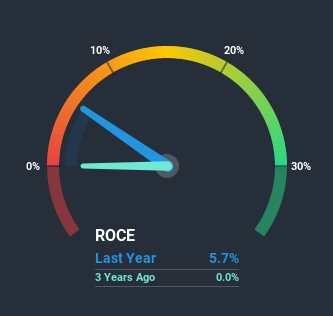
To find a multi-bagger stock, what are the underlying trends we should look for in a business? Amongst other things, we'll want to see two things; firstly, a growing return on capital employed (ROCE) and secondly, an expansion in the company's amount of capital employed. Basically this means that a company has profitable initiatives that it can continue to reinvest in, which is a trait of a compounding machine. Although, when we looked at NPO Nauka (MCX:NAUK), it didn't seem to tick all of these boxes.
Return On Capital Employed (ROCE): What is it?
Just to clarify if you're unsure, ROCE is a metric for evaluating how much pre-tax income (in percentage terms) a company earns on the capital invested in its business. The formula for this calculation on NPO Nauka is:
Return on Capital Employed = Earnings Before Interest and Tax (EBIT) ÷ (Total Assets - Current Liabilities)
0.057 = ₽282m ÷ (₽6.0b - ₽1.1b) (Based on the trailing twelve months to June 2020).
Therefore, NPO Nauka has an ROCE of 5.7%. In absolute terms, that's a low return and it also under-performs the Aerospace & Defense industry average of 10.0%.
See our latest analysis for NPO Nauka

Historical performance is a great place to start when researching a stock so above you can see the gauge for NPO Nauka's ROCE against it's prior returns. If you want to delve into the historical earnings, revenue and cash flow of NPO Nauka, check out these free graphs here.
So How Is NPO Nauka's ROCE Trending?
Over the past one year, NPO Nauka's ROCE and capital employed have both remained mostly flat. It's not uncommon to see this when looking at a mature and stable business that isn't re-investing its earnings because it has likely passed that phase of the business cycle. So don't be surprised if NPO Nauka doesn't end up being a multi-bagger in a few years time.
What We Can Learn From NPO Nauka's ROCE
In a nutshell, NPO Nauka has been trudging along with the same returns from the same amount of capital over the last one year. Yet to long term shareholders the stock has gifted them an incredible 104% return in the last five years, so the market appears to be rosy about its future. But if the trajectory of these underlying trends continue, we think the likelihood of it being a multi-bagger from here isn't high.
If you'd like to know more about NPO Nauka, we've spotted 4 warning signs, and 2 of them don't sit too well with us.
While NPO Nauka may not currently earn the highest returns, we've compiled a list of companies that currently earn more than 25% return on equity. Check out this free list here.
If you decide to trade NPO Nauka, use the lowest-cost* platform that is rated #1 Overall by Barron’s, Interactive Brokers. Trade stocks, options, futures, forex, bonds and funds on 135 markets, all from a single integrated account. Promoted
If you're looking to trade NPO Nauka, open an account with the lowest-cost platform trusted by professionals, Interactive Brokers.
With clients in over 200 countries and territories, and access to 160 markets, IBKR lets you trade stocks, options, futures, forex, bonds and funds from a single integrated account.
Enjoy no hidden fees, no account minimums, and FX conversion rates as low as 0.03%, far better than what most brokers offer.
Sponsored ContentValuation is complex, but we're here to simplify it.
Discover if NPO Nauka might be undervalued or overvalued with our detailed analysis, featuring fair value estimates, potential risks, dividends, insider trades, and its financial condition.
Access Free AnalysisThis article by Simply Wall St is general in nature. It does not constitute a recommendation to buy or sell any stock, and does not take account of your objectives, or your financial situation. We aim to bring you long-term focused analysis driven by fundamental data. Note that our analysis may not factor in the latest price-sensitive company announcements or qualitative material. Simply Wall St has no position in any stocks mentioned.
*Interactive Brokers Rated Lowest Cost Broker by StockBrokers.com Annual Online Review 2020
Have feedback on this article? Concerned about the content? Get in touch with us directly. Alternatively, email editorial-team (at) simplywallst.com.
About MISX:NAUK
NPO Nauka
Public joint stock company NPO Nauka engages in the manufacture and sale of aerospace equipment in Russia and internationally.
Fair value with mediocre balance sheet.
Market Insights
Community Narratives




